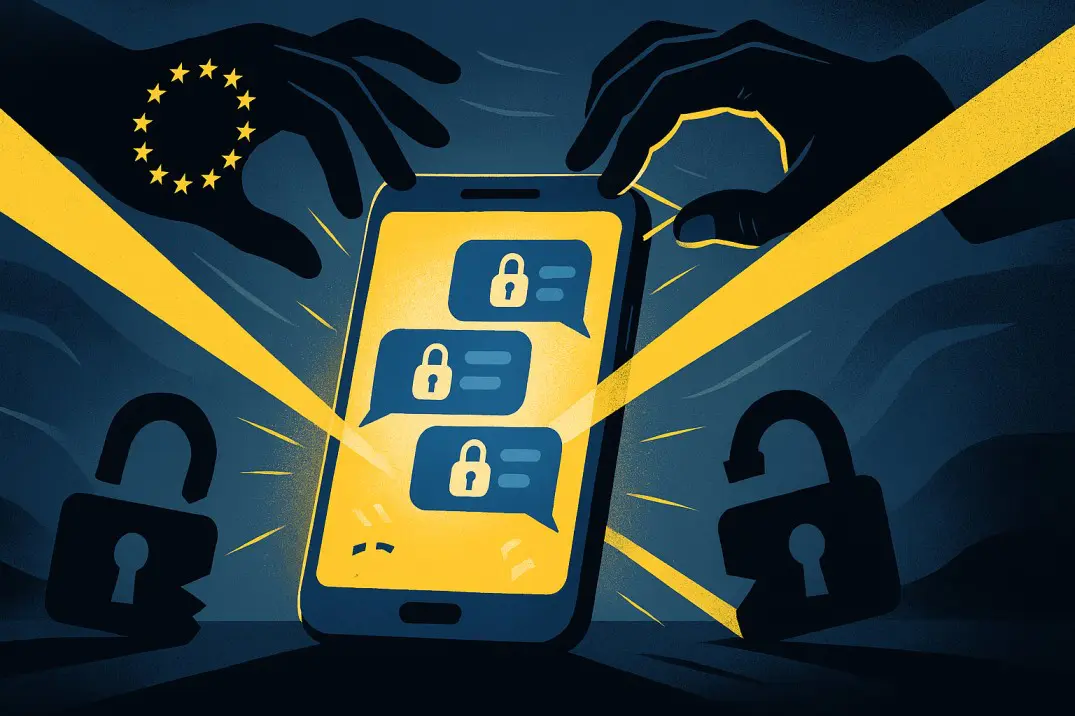The European Union is preparing to decide the future of digital privacy. On September 12, 2025, Member States had to declare their positions on the Child Sexual Abuse Regulation (CSAR), better known as Chat Control, with a final vote scheduled for October 14, 2025.
If passed, this legislation would require messaging platforms like WhatsApp, Signal, iMessage, and others to scan all private messages, including encrypted ones, for illegal content.
The goal is to combat child sexual abuse material (CSAM).
In reality, however, citizens across Europe would be left vulnerable to mass surveillance, their data exposed to abuse by governments or hackers — a dangerous precedent for democratic societies.
What Chat Control Proposes
The CSAR would obligate providers of messaging services to detect and report CSAM. This sounds reasonable in principle, but in practice it means:
- Client-side scanning: Messages are checked before they are sent, even inside end-to-end encrypted apps.
- Algorithmic detection: Automated tools would search not only for known illegal content but also attempt to predict grooming or suspicious behavior.
- Mandatory reporting: Platforms would be legally bound to forward flagged communications to authorities.
In short, your private photos, texts, and voice notes would no longer be truly private.
Here’s the catch: EU politicians exempt themselves from this proposal under “professional secrecy” rules. They get privacy. You and your family do not.
Why It Won’t Work
The backlash from the scientific community has been overwhelming.
- Over 500 cryptographers and security researchers signed an open letter warning that Chat Control is technically infeasible and a danger to democracy.
- Another 400 scientists echoed those concerns, stressing that breaking encryption creates single points of failure ripe for abuse by hackers or governments.
- Researchers also highlighted the false positive problem. Automated scanning systems inevitably make mistakes, potentially flagging innocent family photos, artwork, or conversations.
Furthermore, Meta, which already performs voluntary scanning, reported 22 million cases in 2021. But according to the EU, 75% of these reports are useless to the police. Resources are wasted, diverted from targeted investigations.
Who Supports and Who Opposes
The proposal has split Europe.
- Supporters (about 15 countries): France, Italy, Spain, Sweden, Ireland, and others.
- Opponents: Austria, the Netherlands, Poland, Belgium, the Czech Republic, and Finland.
- Undecided: Germany, Estonia, Greece, Luxembourg, Romania, Slovenia.
Inside the European Parliament, resistance is cross-party. Green, liberal, and Pirate MEPs oppose the bill, as do some conservatives.
Czech MEP Filip Turek declared: “My official position … is clear. I will vote AGAINST! I receive hundreds of emails on this topic every day.”
Finnish MEP Aura Salla warned that the law “poses a massive risk of exposing our private communications and photos.”
All Maltese MEPs (apart from the President of the EP, Roberta Metsola) also voiced their concerns, despite the Maltese Government’s support for the proposal
My Perspective
A free society does not sacrifice everyone’s rights for ineffective measures. Chat Control is a Trojan horse: Under the guise of morality, it establishes a censorship and surveillance infrastructure that threatens the very essence of our liberal democracies.
Under this proposal, every EU citizen would be treated as a potential criminal, and once encryption is broken for CSAM, the same tools could be repurposed for terrorism, hate speech, or political dissent.
To make matters worse, once the EU, often seen as a standard-setter, normalizes surveillance-by-default, authoritarian regimes will point to Europe to justify their own censorship.
Child protection is an urgent and noble cause. But liberty cannot be defended by destroying it.
Citizens Are Mobilizing
Civil society has responded. Campaigns like Fight Chat Control give citizens tools to contact their governments and MEPs. Privacy advocates stress that real solutions, like better funding for police, faster international cooperation, and targeted warrants exist without undermining encryption.
Public pressure matters. As one MEP put it: “Your emails, your voices, make a difference.”
What Happens Now?
- September 12, 2025: EU Member States finalize their positions.
- October 14, 2025: The decisive vote in the Council.
If passed, Chat Control would mark the largest expansion of surveillance in EU history. If rejected, it could set a global precedent for protecting encryption and reaffirming the principle that privacy is a human right, not a privilege granted by the state.
Therefore, the European Union stands at a crossroads. Will it choose the path of liberty, upholding secure communications and the right to privacy? Or will it take a step toward digital authoritarianism under the banner of child protection?
The clock is ticking, and the world is watching.
Sources:
1. EU Tech Loop – Time is running out for EU Member States to decide on Chat Control (Yaël Ossowski, Sept 4, 2025)
eutechloop.com
2. TechRadar – The EU could be scanning your chats by October 2025: Here’s everything we know (Aug 2025)
techradar.com
3. TechRadar – It’s just smoke and mirrors: Over 500 cryptography scientists and researchers slam the EU proposal to scan all your WhatsApp chats (Sept 2025)
techradar.com
4. Patrick Breyer (Pirate Party MEP) – Danger to Democracy: 500 top scientists urge EU governments to reject technically infeasible Chat Control (2025)
patrick-breyer.de
5. Fight Chat Control campaign – fightchatcontrol.eu
This article was originally published in Learn Liberty Blog.
This piece solely expresses the opinion of the author and not necessarily the magazine as a whole. SpeakFreely is committed to facilitating a broad dialogue for liberty, representing a variety of opinions. Support freedom and independent journalism by donating today.
